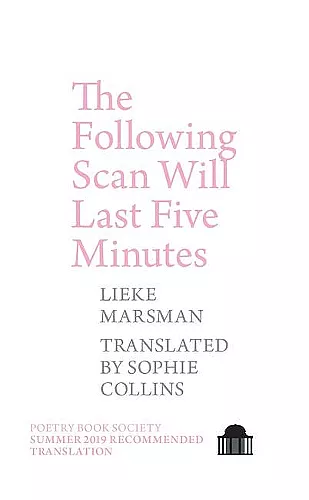The Following Scan Will Last Five Minutes
Lieke Marsman author Sophie Collins translator
Format:Paperback
Publisher:Liverpool University Press
Published:30th Apr '19
Should be back in stock very soon

Poetry Book Society Summer Choice, Recommended Translation 2019.
In The Cancer Journals Audre Lorde wrote, ‘I do not wish my anger and pain and fear about cancer to fossilise into yet another silence, not to rob me of whatever strength can lie at the core of this experience, openly acknowledged and examined.’ Founded on this same principle, The Following Scan Will Last Five Minutes was written in the three months following Dutch writer Lieke Marsman’s cancer diagnosis. A series of short poems anchored by an essay that speaks directly to Lorde’s journal entries and personal reflections on cancer, Marsman considers, among other things, the state of contemporary Dutch politics and – via Susan Sontag’s Illness as Metaphor – the rhetoric surrounding her disease. A work of poetry, social criticism and autobiography, The Following Scan is an honest and dryly comic account of a period in the author’s life that elides pretension in search of autonomy and self-knowledge. Beautifully translated by the poet Sophie Collins, the book also includes a translator’s note in the form of a letter to her author and friend.
'This is the work of two remarkable poets in collaboration and conversation. Lieke Marsman has evolved a stringent poetics of limit and capacity, of body and language and self. The scan is a metaphor for Marsman’s particular quality of attention - committed and complete.'
Lavinia Greenlaw
For previous edition: ‘Ten poems and an essay about cancer, for which Marsman was treated. But it is also about so much more: about loneliness, being on benefits, economic sensationalism and freedom of expression.’
NRC Handelsblad
‘What this [essay] section adds to the book is something that is rarely present in translated works – the relationship between a writer and their translator…and the final book is ultimately a genuine collaboration.’
Platon Poulas, Pendora Magazine
‘Between them these two authors have produced a remarkable hybrid sort of book, grown from the astonishingly rich soil of empathetic response to others, expressive of a range of human intimacies as well as a variety of angers at the way individuals – and society – too easily succumb to blinkered self-interest and self-immuration.’
Martyn Crucefix
‘The poems speak plainly and think plainly and that is their power as translated by Collins, but their effect is to offer a multi-dimensional set of reports, contemplations and intense but underplayed tensions. It isn’t a normal book of poetry, but it is certainly poetry and despite its plainness and nakedness there is little like it.’
George Szirtes, Poetry Book Society
‘Marsman’s and Collins’ collaboration packs a punch, and is mightily worthy of its Poetry Book Society Recommendation.’
Afric McGlinchey, Orbis
‘Lieke Marsman and Sophie Collins have written a work that embodies a deep affection and attentiveness to the lives they have led, and the world we live in is better for it.’
Kyle Lovell, Stride
‘Beyond the poems themselves – which are an achievement – and their sparkling social criticism, this is the book’s greatest gift: a model of how to how to read, write, and speak with one another, despite our different languages, in the face of ‘the loneliest experience there is’.’
Theophilus Kwek, Modern Poetry in Translation
‘This is a treasure of a book, uplifting and courageous, with many of the qualities of a trusted companion; honesty, humour and empathy.’
Jane Swanson, Dundee University Review of the Arts
'Marsman’s poems crackle with dry insight, discerning yet anxious, flirting with that well-timed moment whenever the joke must end; her unflinching rhetoric neither sentimentalises death nor shies away from the accessible comforts of life. [...] The satirical wit and self-reflexivity in Marsman’s persuasive poems jabs its fingers right into a certain faddish Western class-anxiety but the narrator never lets us forget. [...]
Through letters written to Marsman, Collins tackles issues including shame and autonomy, as well as criticising the mechanical and patriarchal language of contemporary review culture. These cerebral disclosures become valuable spaces allowing us to encounter, through a one-sided conversation, a translation process no longer hidden; the amount of space given to Collins feels powerful, made more so by the absence of Marsman’s (presumed, but never seen) responses. Although Collins writes about self-doubt and anxiety, there is an absolute certitude in her beliefs about how the field of translation can become more conscientious; through her work Collins has undoubtedly lifted herself from a “neutral entity” into an active participant in the most crucial dialogues surrounding Anglophone poetry translation today. [...]
These are timely books adamant about candidly highlighting their own assemblies. [...] Instead they offer rewarding new ways of seeing translations as poetic sites of engagement with the subversive. The visibility of their translators places everybody involved on a level that resists traditional hierarchies, gender roles and capitalist understanding: they revolt against fluency and, in doing so, tap into a pocket of structural-societal questioning that refuses to be minimised or made invisible.'
Jay G. Ying, The Poetry Society
ISBN: 9781786942135
Dimensions: unknown
Weight: unknown
62 pages